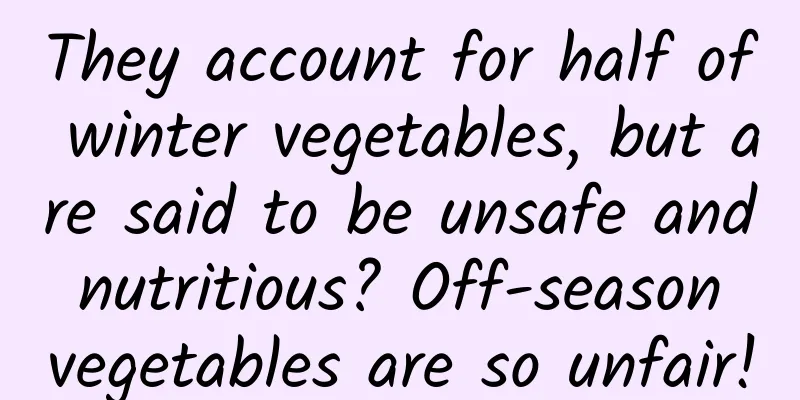They account for half of winter vegetables, but are said to be unsafe and nutritious? Off-season vegetables are so unfair!

|
Author: Wang Lu, Chinese registered dietitian, Master of Public Health, Peking University Reviewer: Xue Qingxin, the first batch of nutrition instructors of the National Health Commission, China registered nutritionist gossip In recent years, people have become more and more concerned about the food safety of vegetables. Many people even grow vegetables on their balconies, believing that they are clean and hygienic . Some people believe that off-season vegetables have pesticide, fertilizer, and hormone residues and are not nutritious . Some people pursue some novel vegetables, believing that novel vegetables have health benefits . Some young people are keen on online shopping for vegetables, believing that online shopping for vegetables is convenient and safe ... Today, let’s work together to solve these problems in eating vegetables and strive to eat safe and cost-effective fresh vegetables. Copyrighted stock images, no reproduction is authorized analyze Growing vegetables on the balcony requires careful attention to details Out of concern for occasional food shortages and food safety issues, people who have the means have started to think about growing vegetables on their balconies. Even celebrities have started to grow vegetables that are easy to grow on their balconies. However, growing vegetables on the balcony is not that simple and there are many details that need to be paid attention to. First of all, you need to select the vegetables you want to grow. Urban farmers are probably not familiar with vegetable seeds. If they accidentally buy wild vegetable seeds that are not suitable for family consumption and grow a plate of poisonous vegetables, it would be very dangerous. A few years ago, there was a news report that a couple was obsessed with growing vegetables on the balcony, but they did not choose the right seeds and grew "balcony wild vegetables" that poisoned the whole family. Secondly, the soil, containers and fertilizers used for growing vegetables should be carefully selected. It is difficult to find soil for growing vegetables in cities, so some people go to small parks or road green belts to dig soil and take it home. However, many parks are transformed from ruins or garbage dumps, and green belts absorb car exhaust for many years. These soils may have been polluted by heavy metals and organic waste. When vegetables grow, they will transfer various pollutants from the soil and concentrate them in the stems and leaves through enrichment. Therefore, the safety of the soil for growing vegetables is directly related to the safety of vegetables. When choosing containers for growing vegetables, avoid using unqualified foam boxes, plastic tubes, and waste paint cans. Do not directly apply untreated household organic fertilizers (such as feces) to prevent bacterial and parasitic infections. Copyrighted stock images, no reproduction is authorized It seems that it is not so easy to enjoy a pastoral life in the city. You need to master more knowledge of botany and planting before you can grow vegetables with peace of mind. Off-season vegetables are safe to eat Most of the winter vegetables rely on off-season vegetables, but some people always worry that off-season vegetables have pesticides, fertilizers, hormone residues, or do not taste like vegetables and have no nutrition. In fact, the concept of "off-season vegetables" is more applicable to the north, because in the vast southern regions, especially in the warm subtropical cities, "seasonal vegetables" can be eaten all year round. There are three sources of "off-season vegetables" on the northern market: one is "southern vegetables" that are shipped all the way from the south to the north. Except for the loss of some sugars, vitamins and flavor substances during transportation and storage, which affects the taste, the content of other nutrients is almost the same as when they were in their hometown. If "southern vegetables" are not over-applied with pesticides, fertilizers or plant hormones during their growth and development period, such hidden dangers will not appear out of thin air after being transported to the north. The second type of off-season vegetables comes from local fruit and vegetable cold storage. Some vegetables that are particularly suitable for long-term storage (such as root vegetables, melons and tomatoes, and garlic sprouts) are purchased and stored in large quantities in summer and autumn, and then sold in winter. Strictly speaking, they are not "off-season vegetables" but "vegetables sold off-season." Due to the low storage temperature, the loss of nutrients in these vegetables is still within an acceptable range. So what about the nitrite problem that people are more worried about? The nitrate in vegetables will turn into nitrite under the action of bacteria, but bacteria need a certain temperature to survive and react. The low temperature environment in the cold storage is not suitable for bacterial survival, so there is no need to worry about the safety of the second type of "off-season vegetables." Copyrighted stock images, no reproduction is authorized The third category is local "greenhouse vegetables", which are the real "off-season vegetables". As long as the temperature and humidity in the greenhouse are suitable, the vegetables can grow happily, regardless of whether it is cold outside. However, the "artificial environment" cannot completely simulate the sunshine and temperature in summer and autumn. Although it has little effect on the nutritional content, it directly affects the taste and flavor of the vegetables. As for the problem of pesticide residues in off-season vegetables that everyone is worried about, the current national random inspections have found that the vast majority of pesticide residues in greenhouse vegetables do not exceed the prescribed limits, and the residues of some low-toxic pesticides and organophosphorus pesticides can also be degraded within a few hours by relying on light. It can be said that off-season vegetables have more merits than demerits. Apart from being inferior to seasonal vegetables in taste and aroma, the nutritional difference is not that significant, and there is no need to overreact to the issue of pesticide residues. Novel vegetables are not cost-effective, just experience them In the past two years, many new and novel vegetables have appeared on the market, such as "sprout" vegetables - wheat sprouts, buckwheat sprouts, radish sprouts, Chinese toon sprouts, alfalfa sprouts, etc. Because of the cultivation method, sprouts almost do not involve food safety issues such as pesticides and fertilizers, but this does not mean that they should be deified. Some people believe that drinking wheatgrass juice regularly can prevent tumors and lower blood lipids, blood pressure, and blood sugar, but this is biased. Although wheatgrass contains nutrients such as dietary fiber and vitamins, there is currently no reliable research evidence to support the claim that wheatgrass is good for health. If you abandon regular treatment for this reason, it will be a loss. Some other novel and expensive vegetables, such as Brussels sprouts and finger carrots, look petite and attractive and are also expensive, but their nutritional value is not much better than ordinary cabbage and carrots, so there is no need to blindly pursue them. Online shopping for vegetables: pros and cons, wait and see In recent years, online shopping for vegetables has become a new choice for young people because of its convenience and speed. However, online shopping for vegetables also has its troubles. Sometimes the delivery is late and it delays cooking. Sometimes the quality of the vegetables is too poor and unsatisfactory. Sometimes the website only has organic vegetables, but the price is shocking. Copyrighted stock images, no reproduction is authorized In addition, the safety of vegetables purchased online is not fully guaranteed. The quality of vegetables on different platforms varies greatly, and the resulting food safety issues are worrying; it is also difficult to determine whether some expensive vegetables are really picked that day or organic vegetables. For these reasons, many people are cautious about online vegetable shopping. If you are busy at work, it is recommended to choose large shopping platforms when shopping for vegetables online. Usually, such platforms have a stable supply of goods and have a good quality control system from picking to delivery, so the quality of the vegetables is more guaranteed. At the same time, some fresh food purchasing websites will invite nutritionists to join and give users some suggestions on dish matching, which is beneficial to health. in conclusion It is necessary to worry about the food you eat, but it is unnecessary to worry too much. As long as you understand the risk points of food safety, you don't need to worry too much. Choosing fresh vegetables and combining them in various ways can achieve a good balance between nutrition and safety. Source: Starry Sky Project This article is produced by Science Popularization China - Starry Sky Project (creation and cultivation). Please indicate the source when reprinting. The cover image and the images in the text are from the copyright library. Reprinting and quoting may cause copyright disputes. |
>>: Good news for crybabies, because tears actually contain happy hormones!
Recommend
Apple Watch causes trouble: Many universities prohibit wearing watches during exams
[[127723]] Beijing time, February 9 morning news,...
How to promote an app without any budget?
This article is compiled from Zhihu: Zhihu user: ...
From 0 to 20 million, the 3-year growth path of Get APP
1. Get the PMF of the app PMF, or product-market ...
Apple iOS 15.1 Beta 3 has restored the ability to disable keyboard notifications for Apple TV and Apple Watch separately
[[428304]] According to 9to5 Mac, when the offici...
The form of opening screen advertising!
Mobile advertising comes in many forms. For mobil...
Volkswagen Touareg plug-in hybrid version unveiled: 1,000km range but still criticized
As the flagship of Volkswagen's SUV camp, the...
Volkswagen executives may have known about the amount of compensation for cheating and were suspected of failing to inform investors in a timely manner
According to German newspaper Bild am Sonntag, Vo...
All things grow with the help of the sun. Is it possible to grow without it?
For reprinting, business cooperation, please scan...
The "forbidden zone" that became popular overnight has become a "scenic spot". What makes people love and fear Ailao Mountain?
During the just-passed National Day holiday, Yunn...
High-efficiency website and toolbox essential for new media operations
When it comes to new media operation tools and we...
Two important channels for APP to attract new users: ASO promotion + old user retention
1. ASO optimization : internal and external integ...
When is the celebration meeting for the 100th anniversary of the founding of the Communist Youth League? Attached is the live broadcast replay address!
2022 marks the 100th anniversary of the founding ...
When is the best time to broadcast Taobao Live? How to promote and attract traffic for Taobao Live?
This article mainly introduces the best time peri...
How to write an event plan? 4 basic elements to prioritize
The event background, purpose, theme, and time ar...
The sparrow is too small to have meat! A large number of home appliance dealers have disappeared
In recent years, it is with this mentality that a...









